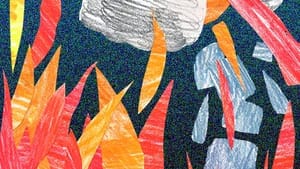Stay in the Loop
BSR publishes on a weekly schedule, with an email newsletter every Wednesday and Thursday morning. There’s no paywall, and subscribing is always free.
Frozen out, boiling over
Fire and ICE

Here’s how I spent part of my summer vacation: I painted onesies with messages like “Quiero a mis padres” (“I want my parents”) and mailed them to the U.S. Office of Refugee Resettlement. I wrote postcards to my senators urging them to reunite migrant families.
And a few days before the Fourth of July, I stood with 3,000 other outraged people at a Logan Circle rally, in a soup of summer heat, hearing speakers of Libyan, Liberian, and Mexican descent call the roll of this administration’s cruelties.
I thought about Robert Frost’s 1920 poem:
"Some say the world will end in fire / Some say in ice."
So far, the summer of 2018 is dishing up plenty of both. Seventy-three large fires have scorched more than 700,000 acres across 14 states. Record heat blisters the country and the polar ice caps dissolve daily into the rising seas. Under Trump’s aegis, the Environmental Protection Agency (whose title now seems a cruel misnomer) systematically strips those protections while coddling the coal, oil, and gas industries.
Meanwhile, refugees surge around the globe, seeking relief from war, scarcity and climate change. And on our soil, ICE (can it be accidental, that cold blade of an acronym?) continues its brutal work. You’ve seen the videos: children in chain-link cages. Tearful parents pleading through interpreters to know the whereabouts of their babies whisked off to detention centers around the country.
Do the agents of ICE and the Trump administration’s orchestrators of this chaos have permafrost where their hearts should be? Has greed —for wealth, for land, for power — rendered them so shortsightedly numb? Or is it fear, an unnerving sense that the America they cherished (sexist; xenophobic; hostile to Jews, Muslims, queers, and, oh yeah, the Native people who lived here first) is slipping from their grasp?
In April, U.S. Attorney Jeff Sessions announced the agency’s harsh new policy for illegal border crossings.
Here was his chilling explanation: “If you cross this border unlawfully, then we will prosecute you. It’s that simple… If you are smuggling a child, then we will prosecute you and that child will be separated from you as required by law. If you don’t like that, then don’t smuggle children over our border.”
The White House launched this “zero tolerance” sweep while simultaneously clamping down on the asylum program. As of June, flight from domestic violence or gang violence is no longer a legitimate reason to seek refuge in the United States. My great-grandparents fled gang violence in Russia. Back then, they called it pogroms.

When people decry the ICE policy as “un-American,” they forget we have a long, ugly track record of yanking children from their parents — in slavery, through mass incarceration, with the removal of Indian youngsters to white boarding schools. They forget that state-ordered family separation is as much a part of our complicated, paradoxical history as the inalienable right to life, liberty and the pursuit of happiness.
“From what I’ve tasted of desire / I hold with those who favor fire.”
Where to turn for energy, solidarity, hope? Maybe to the 11-year-old girl I spotted at the rally, whose sign name-checked lyrics from the musical Hamilton: “History has its eyes on you.” Or, to the quote I saw recently, defining social justice as “a moral imperative to care.”
Perhaps I could look to my rabbi, who presided over a mourners’ service the day after the rally and reminded us of the inherent privilege in a traditional evening prayer: we give thanks that we may close our eyes each night in peace.
I thought of families the world over, wrenched apart by land mines or prison bars, famine or civil war. I thought about rhetoric calling migrant mothers and fathers “aliens” or “animals.” They’re words aimed at hardening hearts, at making us think of "those people" as less than human and their yearning as nothing like our own.
“But if it had to perish twice / I think I know enough of hate / To say that for destruction ice / Is also great / And would suffice.”
There are a thousand ways to hurt each other, to set the earth ablaze or freeze some people out. Take your pick. Or choose something else, a path that feels improbably narrow at this hot, fraught moment.
That path — the one leading to freedom — has always been vertiginous, unsafe. It was that way 250 years ago, when the colonists walked it with their radical mess of democracy and their gendered, racist, far-from-perfect take on what it meant to form a nation of equals. It’s been a treacherous path ever since.
But we must walk it because anywhere else is the abyss. Hug your kids, if you have them. Then, with the next generation as your witness, call your senators, governor, mayor, daily, relentlessly. Tell those officials, with your voice and vote, you want to live in a world that will not perish. Tell them you care — about the fires, the ice caps, and families, about what happens next, and next, and next.
Sign up for our newsletter
All of the week's new articles, all in one place. Sign up for the free weekly BSR newsletters, and don't miss a conversation.

 Anndee Hochman
Anndee Hochman
 Illustration by Hannah Kaplan
Illustration by Hannah Kaplan